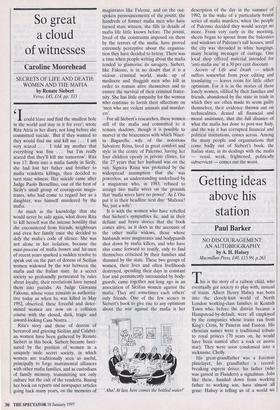So great a cloud of witnesses
Caroline Moorehead
SECRETS OF LIFE AND DEATH: WOMEN AND THE MAFIA by Renate Siebert Verso, £45, £14, pp. 333 Icould leave and find the smallest hole in the world and stay in it for ever', wrote Rita Atria in her diary, not long before she committed suicide. 'But if they wanted to they would find me and kill me . . . I am very scared . . . I told my mother that everything was fine . . . but I'm really scared that they'll kill me tomorrow'. Rita was 17. Born into a mafia family in Sicily, she had lost her father and brother to mafia vendetta killings, then decided to turn state witness. Her suicide came after Judge Paolo Borsellino, one of the best of Sicily's small group of courageous magis- trates, who had come to regard her as a daughter, was himself murdered by the mafia.
As much as the knowledge that she would never be safe again, what drove Rita to kill herself was the intense hostility that she encountered from friends, neighbours and even her family once she decided to defy the mafia's code of silence. She was not alone in her isolation, because the maxi-processi of mafia bosses and hit-men of recent years sparked a sudden resolve to speak out on the part of dozens of Sicilian women widowed by the war between the mafia and the Italian state. In a secret society so profoundly permeated by rules about loyalty, their revelations have turned them into pariahs. As Judge Giovanni Falcone, whose voice remains as authorita- tive today as when he was killed in May 1992, observed, these forceful and deter- mined women are now on a collision course with the closed, dark, tragic and inward-looking Casa Nostra.
Rita's story and those of dozens of bereaved and grieving Sicilian and Calabri- an women have been gathered by Renate Siebert in this book. Siebert became fasci- nated by the position of women in a uniquely male secret society, in which women are traditionally seen as useful, principally to forge matrimonial alliances with other mafia families, and as custodians of family memory, transmitting not only culture but the cult of the vendetta. Basing her book on reports and newspaper articles going back many years, on-the memoirs of magistrates like Falcone, and on the out- spoken pronouncements of the pentiti, the hundreds of former mafia men who have turned state witness, she fills in details of mafia life little known before. The pentiti, freed of the constraints imposed on them by the terrors of the mafia, have proved extremely perceptive about the organisa- tion they have decided to betray. There was a time when people writing about the mafia tended to glamorise its savagery. Siebert, like Falcone, is in no doubt that it is a vicious criminal world, made up of mediocre and thuggish men who kill in order to remain alive themselves and to ensure the survival of their criminal frater- nity. She has little sympathy for the women who continue to lavish their affections on `men who are violent animals and murder- ers'.
For all Siebert's researches, these women still of the mafia and committed to it remain shadowy, though it is possible to marvel at the brazenness with which Ninet- ta Bagarella, wife of the notorious Salvatore Riina, lived in great comfort and style in the centre of Palermo, having her four children openly in private clinics, for the 27 years that her husband was on the run. Signora Riina was protected by the widespread assumption that she was powerless, an understanding underlined by a magistrate who, in 1983, refused to arraign two mafia wives on the grounds that `mafia wives have no power'. As L'Ora put it in their headline next day: `Mafiosa? No, just a wife'.
It is with the women who have rebelled that Siebert's sympathies lie, and in their defiant and brave stories that the book comes alive, as it does in the accounts of the other mafia widows, those whose husbands were magistrates and bodyguards shot down by mafia killers, and who have also come forward to testify, only to find themselves criticised by their families and shunned by the state. These two groups of women, their lives and often livelihoods destroyed, spending their days in constant fear and permanently surrounded by body- guards, came together not long ago in an association of Sicilian women against the mafia. They are sometimes each others' only friends. One of the few scenes in Siebert's book to give rise to any optimism about the war against the mafia is her Aha! At last, here comes the bottled water!' description of the day in the summer of 1992, in the wake of a particularly brutal series of mafia murders, when the people of Palermo decided they would accept no more. From very early in the morning, sheets began to sprout from the balconies and windows of Palermo's tall houses, until the city was shrouded in white hangings, many bearing messages of outrage. One local shop offered material intended for `anti-mafia use' at a 30 per cent discount.
Secrets of Life and Death — which suffers somewhat from poor editing and translating — leaves room for little other optimism. For it is in the stories of these lonely women, vilified by their families and friends, abandoned by the state in trials in which they are often made to seem guilty themselves, their evidence thrown out on technicalities, denied all financial and moral assistance, that the full disaster of what the mafia has done to post-war Italy, and the way it has corrupted financial and political institutions, comes across. Among the many people and organisations that come badly out of Siebert's book, the Italian state, in its dealings with the mafia — venal, weak, frightened, politically subservient — comes out the worst.


























































 Previous page
Previous page